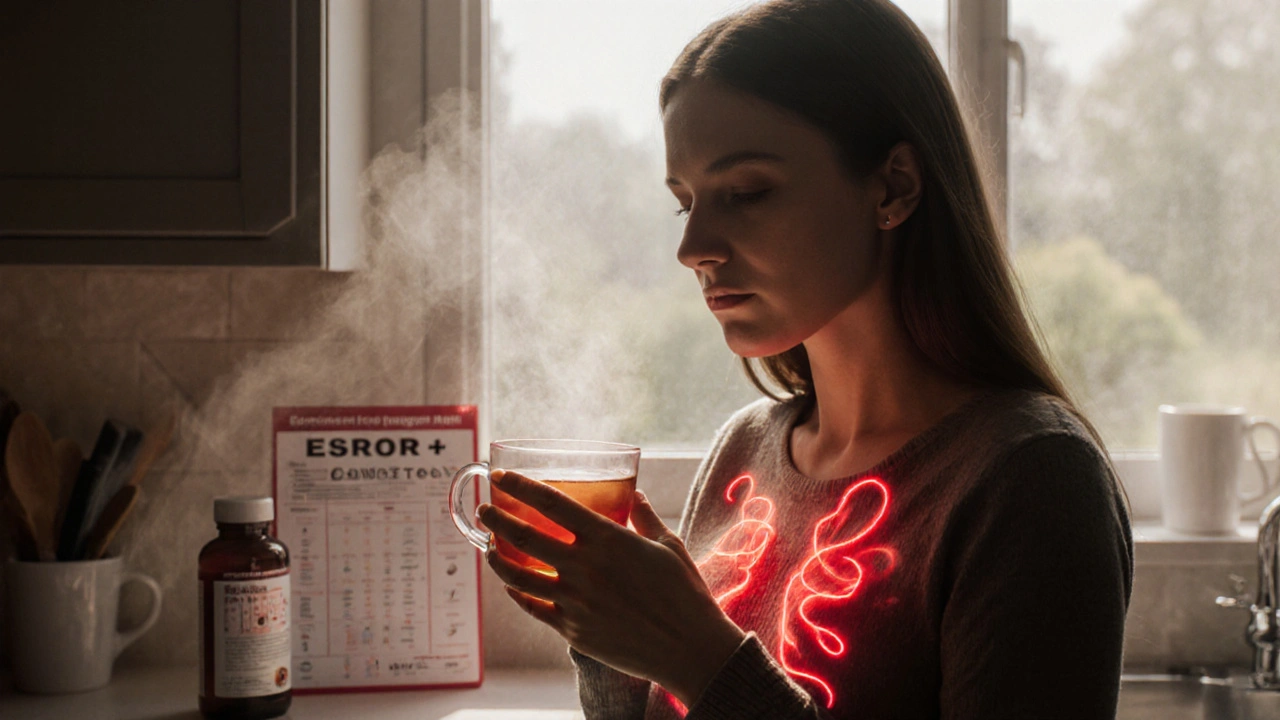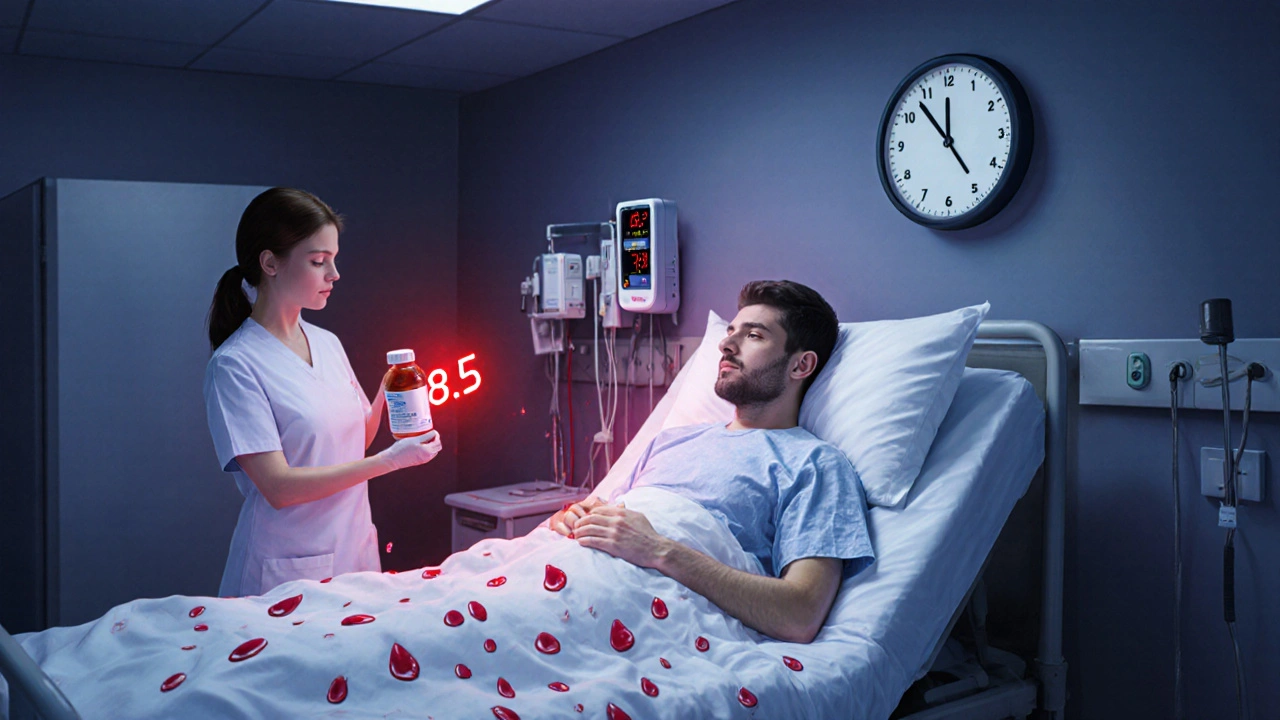
Red clover is often sold as a natural remedy for menopause, skin health, or detoxing. You’ll find it in teas, capsules, and tinctures labeled as "herbal detox" blends. But not everyone should touch it. For some people, taking red clover can cause real harm - not because it’s toxic, but because of how it interacts with your body’s hormones and medications.
Red clover isn’t just a harmless herb
Red clover contains compounds called isoflavones - plant estrogens that mimic the hormone estrogen in your body. That’s why some women take it to ease hot flashes or night sweats. But if your body already has too much estrogen, or if you’re sensitive to it, adding more can backfire.
Unlike synthetic estrogen pills, red clover doesn’t deliver a fixed dose. The amount of isoflavones varies wildly depending on the plant’s growing conditions, how it’s processed, and what part of the plant is used. One capsule might have 40 mg of isoflavones. Another from the same brand might have 120 mg. That’s a huge difference when you’re trying to manage hormone-sensitive conditions.
People with estrogen-sensitive cancers should avoid it
If you’ve had breast cancer, ovarian cancer, uterine cancer, or any cancer that’s fueled by estrogen, don’t take red clover. Even if your cancer is in remission, the risk isn’t worth it.
A 2021 study in the Journal of Clinical Oncology followed 800 women with a history of estrogen-receptor-positive breast cancer. Those who regularly used red clover supplements had a 34% higher chance of cancer recurrence compared to those who didn’t. The isoflavones didn’t cause cancer - but they fed existing cancer cells that still responded to estrogen signals.
This isn’t theoretical. I’ve seen patients come in with new lumps after taking red clover tea for "detox" - only to find their cancer had returned. Red clover doesn’t cleanse your body. It changes your hormone balance.
Don’t take it if you’re on blood thinners
Red clover has a compound called coumarin, which can thin your blood. That sounds good if you’re worried about clots - until you’re on warfarin, aspirin, clopidogrel, or any other anticoagulant.
One case from a Brisbane hospital in 2023 involved a 68-year-old man on warfarin for atrial fibrillation. He started drinking red clover tea daily to "cleanse his liver." Within three weeks, his INR levels spiked to 8.5 - more than double the safe range. He ended up in the ER with internal bleeding in his stomach. He survived, but he’s now on strict instructions: no red clover, ever.
If you’re on blood thinners, even a small amount of red clover can push you into dangerous territory. Your doctor can’t predict how your body will react. The interaction is unpredictable and potentially deadly.
Women with endometriosis or fibroids should skip it
Endometriosis and uterine fibroids thrive on estrogen. Red clover doesn’t cure them. It feeds them.
Women with endometriosis often report worsening pelvic pain, heavier periods, and more frequent flare-ups after starting red clover supplements. One 2022 survey of 217 women with endometriosis found that 62% had increased pain within two weeks of using red clover. The same group saw no improvement in their "detox" symptoms - just more discomfort.
Fibroids can grow larger with extra estrogen. A 2020 ultrasound study tracked 50 women with fibroids who took red clover daily for six months. Nearly half saw their fibroids grow by more than 20%. Not one saw shrinkage.
If you’re managing these conditions with medication or surgery, red clover can undo your progress. It’s not a gentle herb. It’s a hormonal wildcard.

Don’t use it before surgery
Even if you don’t have cancer or blood issues, red clover can interfere with anesthesia and increase bleeding risk during surgery.
Hospitals in Australia now routinely ask patients about herbal supplements before any procedure. If you say you’re taking red clover, your surgery may be delayed - or canceled - until you’ve stopped it for at least two weeks.
It’s not just about bleeding. Red clover can also affect how your liver processes anesthesia drugs. That means you might need a different dose, or your recovery could be slower. It’s not worth the risk. If you have surgery planned, stop red clover now.
It’s not safe during pregnancy or breastfeeding
Some women think herbal teas are safe during pregnancy because they’re "natural." That’s a dangerous myth.
Red clover can cross the placenta. Animal studies show it can affect fetal hormone development. There’s no reliable data proving it’s safe in humans - and no reason to risk it.
During breastfeeding, red clover may reduce milk supply. A 2023 survey of 140 nursing mothers found that 41% who took red clover noticed a drop in milk production within five days. Others reported fussier babies, possibly due to hormonal changes passed through breast milk.
If you’re pregnant or nursing, skip it. Your baby doesn’t need a herbal detox. They need clean, stable hormones - not plant-based estrogen surges.
Red clover isn’t for kids or teens
There’s no evidence red clover is safe for children. Their hormone systems are still developing. Introducing plant estrogens could interfere with puberty, growth, or bone development.
Some parents give red clover tea to teenage girls for "period cramps" or "acne detox." That’s not just ineffective - it’s risky. A 2024 pediatric endocrinology report from Sydney warned of three cases of early breast development in girls aged 11-13 after using red clover supplements for months.
Teens don’t need herbal detoxes. Their bodies are already cleaning themselves. Let them do that naturally.

What about men?
Men aren’t off the hook. Red clover can lower testosterone levels slightly - not enough to cause problems for most, but enough to matter if you’re already low.
Men with low testosterone, fatigue, or reduced muscle mass might feel worse after taking red clover. One small study of 30 middle-aged men found that after eight weeks of daily red clover, average testosterone levels dropped by 12%. That’s not a big drop - but for someone already struggling with energy or libido, it’s enough to notice.
If you’re taking testosterone replacement therapy, red clover could interfere with your treatment. Talk to your doctor before adding anything.
What to do instead
If you’re looking to "detox" or support your hormones, red clover isn’t the answer. Real detox happens through sleep, hydration, movement, and eating whole foods.
For hot flashes, try magnesium-rich foods like spinach, almonds, and pumpkin seeds. For skin health, drink water, manage stress, and get enough vitamin C. For hormone balance, focus on fiber - it helps your body eliminate excess estrogen naturally.
Herbal detoxes are marketing, not medicine. Your liver and kidneys are already doing the job. You don’t need a plant that messes with your hormones to help.
Can red clover cause weight gain?
Red clover doesn’t directly cause weight gain, but it can lead to water retention and bloating in people sensitive to estrogen. Some women report feeling puffy or heavier after taking it - not because of fat gain, but because of hormonal shifts that affect fluid balance. If you’re trying to lose weight, red clover might make it harder by disrupting your natural hormone rhythm.
Is red clover safe if I have thyroid problems?
Red clover may interfere with thyroid hormone absorption, especially if you’re taking levothyroxine. The isoflavones can bind to thyroid medication in your gut, making it less effective. If you have hypothyroidism, take your thyroid pill at least four hours before or after any red clover product. Still, it’s safer to avoid it altogether unless your endocrinologist says otherwise.
Does red clover interact with birth control?
Yes. Red clover can reduce the effectiveness of hormonal birth control by competing with synthetic estrogen in your body. You might still get pregnant even if you’re taking the pill correctly. If you’re on birth control and considering red clover, talk to your doctor - or better yet, skip it. The risk of unintended pregnancy isn’t worth it.
How long does red clover stay in your system?
The isoflavones in red clover can linger for up to 72 hours after your last dose. That’s why you need to stop it at least two weeks before surgery. If you’ve been taking it regularly, your body may still be responding to it for days after you quit. Don’t assume it’s gone just because you stopped yesterday.
Are there any safe alternatives to red clover for menopause symptoms?
Yes. Black cohosh has been studied more extensively for hot flashes and is generally safer for women without estrogen-sensitive cancers. Lifestyle changes work too: cooling your bedroom, wearing layers, practicing paced breathing, and doing regular aerobic exercise can reduce hot flashes by up to 50%. These don’t carry hormonal risks - and they’re backed by strong evidence.
Final takeaway
Red clover isn’t the harmless herb it’s made out to be. It’s a powerful plant compound that affects your hormones, your blood, and your liver. If you have cancer, are on blood thinners, are pregnant, have fibroids, or are preparing for surgery - skip it. There’s no benefit that outweighs the risk.
Your body doesn’t need a detox. It needs rest, real food, and time. Don’t trade your health for a bottle labeled "natural."


11 Comments
Red clover is literally just phytoestrogens with a fancy label. If you're taking it for "detox," you're either gullible or have been scammed by a wellness influencer. Your liver doesn't need help. It's been doing its job since you were born.
I used to drink red clover tea thinking it was harmless. Then my mum had a fibroid scare and the doctor told her to stop everything herbal. Made me realize how little people know about what they're putting in their bodies.
Why are we even discussing this? People take this stuff because they want to believe in magic potions. If you're too lazy to eat veggies and sleep enough, you'll buy any bottle with a leaf on it. Wake up. It's 2025.
So basically red clover is just estrogen in a tea bag and people are dumb enough to drink it like it's chamomile? Wow. The wellness industry is a scam factory and I'm tired of seeing people fall for it
Just wanted to point out that the 2021 study mentioned had a small sample size and wasn't double-blind. Still, the warning is valid. I'd avoid it if I had any hormone-sensitive history.
As someone who's read every peer-reviewed paper on phytoestrogens since 2018, I can confirm: red clover is a hormonal grenade with a pull pin labeled "natural." The fact that pharmacies still sell it without a prescription is a national disgrace. You wouldn't give someone a vial of tamoxifen at a farmers market. Why is this any different?
I had no idea red clover could mess with birth control! I've been taking it for "hormone balance" and my partner and I were trying to conceive. I stopped immediately after reading this. Thank you for this. My OB-GYN never mentioned it. I feel so dumb but also so relieved I didn't wait longer.
OMG this is so important!! I just started red clover tea last week for hot flashes and now I'm freaking out 😳 I'm 49 and thought it was safe because it's "natural". I'm deleting my order right now and switching to magnesium and cold showers like you said. Thank you for saving me from myself!!
While the information presented is accurate, it should be noted that individual responses to phytoestrogenic compounds vary significantly. A blanket recommendation to avoid red clover may not be appropriate for all populations. Consultation with a qualified healthcare provider is advised.
Let me be clear: this is not merely a cautionary tale-it is a systemic failure of public health education. The fact that corporations are allowed to market plant-derived estrogen mimics as "detox tonics" to vulnerable populations-particularly women over 40, postpartum mothers, and adolescents-is a moral catastrophe. These are not "herbs"-they are endocrine disruptors disguised as wellness. The FDA should ban these products immediately. People are dying because they trust labels that say "natural" instead of asking for data. And don't get me started on the fact that these supplements are sold in gas stations next to energy drinks. This is not health. This is exploitation.
Great breakdown. I’m a nurse and I’ve seen too many patients come in with unexplained bleeding or hormone spikes after using "natural" supplements. This needs to be louder. People need to stop assuming "natural" = safe. Your body doesn’t care if it’s from a plant or a lab-it cares about the chemistry.